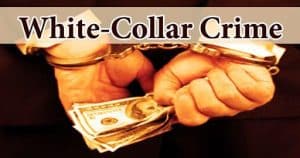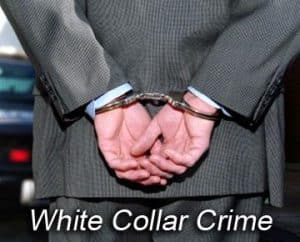Uncategorized
Is Insider Trading Considered A White-Collar Crime? An In-Depth Analysis

Introduction
Insider trading is a term used to describe the buying or selling of stocks or securities based on material non-public information about the company. It is considered a white-collar crime, as it involves individuals who are typically in positions of power or authority within a company, such as executives or employees. This crime is characterized by its clandestine nature, as those involved seek to use their access to insider information for personal gain, often at the expense of other investors who do not have the same inside knowledge. In many countries, including the United States, insider trading is illegal and can result in civil and criminal penalties. Let us discuss this further Is insider trading considered a white-collar crime?
Insider Trading: A Comprehensive Resource On The Subject
Insider Trading: A comprehensive resource on the subject aims to provide a thorough understanding of insider trading as a white-collar crime. It delves into the legal, ethical, and regulatory dimensions of insider trading, examining its implications for financial markets and investor confidence. By exploring key aspects such as the definition of insider trading, the legal framework surrounding it, enforcement efforts, and the consequences for individuals involved, this resource serves as a valuable guide to navigating the complex landscape of insider trading.
With an emphasis on providing accurate and up-to-date information, this resource incorporates insights from relevant laws, regulations, and high-profile cases to shed light on the nuances of insider trading as a white-collar crime. It also explores the similarities and differences between insider trading and other white-collar crimes, highlighting the unique characteristics that distinguish it within the realm of financial misconduct.
By addressing fundamental questions and concerns surrounding insider trading, this comprehensive resource aims to empower readers with knowledge and awareness. It seeks to deepen understanding of the impact of insider trading on market integrity, investor protection, and the broader financial ecosystem. Moreover, this resource underscores the importance of compliance, ethical decision-making, and effective regulation in combating insider trading and upholding the principles of fairness and transparency in financial markets.
Analyzing Insider Trading Within The Context Of White-Collar Crime
Similarities
Financial Motivation
Like other white-collar crimes, insider trading is primarily motivated by financial gain. Individuals involved in insider trading seek to profit from their access to material non-public information, just as individuals engaged in other white-collar crimes aim to obtain financial advantages.
Non-Violent Nature
Both insider trading and other white-collar crimes are non-violent in nature. They do not involve physical harm or direct confrontation, unlike street crimes that may involve theft or physical violence.
Deception And Manipulation
Both insider trading and other white-collar crimes involve deceit and manipulation. Individuals engage in deceptive practices to achieve their illicit financial objectives, whether through insider trading, fraud, embezzlement, or other forms of white-collar crimes.
Impact On Victims
Insider trading and other white-collar crimes can have significant adverse effects on victims. In insider trading, victims include other market participants who trade without the benefit of material non-public information, leading to unfair disadvantages. Similarly, victims of other white-collar crimes may suffer financial losses, reputational damage, or other harmful consequences.
Differences
Nature Of The Crime
Insider trading is specific to trading securities based on material non-public information, whereas other white-collar crimes encompass a broader range of illegal activities, such as fraud, embezzlement, money laundering, and bribery. Insider trading focuses on exploiting information asymmetry in the financial markets, whereas other white-collar crimes may involve different forms of deception, theft, or corruption.
Access To Privileged Information
Insider trading distinguishes itself by the access to material non-public information that insiders possess due to their position or relationship with a company. This privileged information provides an informational advantage over other market participants. In contrast, other white-collar crimes may not necessarily require access to privileged information but rely on different tactics, such as forging documents, engaging in fraudulent schemes, or exploiting vulnerabilities in financial systems.
Legal Framework
Insider trading is often subject to specific laws and regulations governing securities trading, such as the Securities Exchange Act in the United States or the Market Abuse Regulation in the European Union. On the other hand, other white-collar crimes are regulated by a broader range of laws and regulations, including fraud statutes, money laundering laws, and various criminal codes.
Enforcement Efforts
While enforcement efforts exist for both insider trading and other white-collar crimes, the level of attention, resources, and regulatory focus may differ. Insider trading is often a priority for regulatory bodies overseeing securities markets, such as the Securities and Exchange Commission (SEC) in the United States, due to its potential impact on market integrity. Other white-collar crimes may be the focus of different regulatory bodies or law enforcement agencies, depending on the jurisdiction and the specific type of crime involved.
Elements Of Insider Trading As A White-Collar Crime
Financial Motivation And Intent
One of the key elements of insider trading as a white-collar crime is the financial motivation and intent of the individuals involved. Insider trading occurs when individuals trade securities based on material non-public information to gain a financial advantage. The intent to profit from this privileged information is central to establishing insider trading as a white-collar crime. Prosecutors must demonstrate that the individuals knowingly engaged in trading with the intention of making illicit gains.
Exploitation Of Position And Access To Privileged Information
Insider trading also involves the exploitation of a position of trust and access to privileged information. Insiders, such as corporate executives, directors, or employees, have a fiduciary duty to act in the best interest of their organization and its shareholders. They often have access to material non-public information that, if disclosed, could significantly impact the price of securities. By trading on this information, insiders exploit their privileged position and the access they have to gain an unfair advantage over other investors.
Impact On Market Integrity And Public Trust
Insider trading as a white-collar crime has a significant impact on market integrity and public trust. It erodes the confidence of investors and undermines the fairness and transparency of financial markets. When individuals with privileged information trade securities based on that information, it distorts the true market value of those securities. This can lead to a lack of trust in the market, reduced investor participation, and an uneven playing field for market participants. The element of harming market integrity and public trust is a critical aspect of insider trading as a white-collar crime.
Implications And Consequences Of Insider Trading As A White-Collar Crime
Financial Penalties And Disgorgement Of Illicit Gains
Insider trading as a white-collar crime carries significant financial penalties. Individuals found guilty of insider trading may face fines, which can be substantial and may be required to disgorge any illicit gains made from their illegal trades. Disgorgement involves returning the profits obtained through insider trading to the affected parties or the market in general. These penalties aim to deter individuals from engaging in insider trading and to ensure that they do not benefit financially from their illegal activities.
Civil And Criminal Liabilities For Individuals Involved
Insider trading can result in both civil and criminal liabilities for the individuals involved. Civil liabilities may arise from private lawsuits brought by affected parties, such as shareholders or investors who suffered losses due to insider trading activities. These lawsuits can seek damages for the harm caused by insider trading. In addition to civil liabilities, individuals found guilty of insider trading may face criminal charges, which can lead to imprisonment. Criminal prosecutions emphasize the seriousness of insider trading as a white-collar crime and serve as a deterrent for potential offenders.
Reputational Damage And Loss Of Public Trust
Engaging in insider trading can have severe reputational consequences for the individuals involved. The exposure of insider trading activities can lead to reputational damage, tarnishing the image and credibility of the individuals and their associated organizations. Reputational harm may extend beyond the individuals directly involved and affect the broader perception of the organization. Loss of public trust can have long-lasting impacts on professional relationships, career prospects, and business opportunities. Rebuilding trust and reputation after being associated with insider trading can be challenging and time-consuming.
High-Profile Cases: Insider Trading As A White-Collar Crime
Examination Of Notable Insider Trading Cases
High-profile insider trading cases have brought significant attention to the gravity of insider trading as a white-collar crime. Examples include the case of Raj Rajaratnam, the founder of the Galleon Group, who was convicted of insider trading in 2011. Another notable case involved Martha Stewart, the American businesswoman and media personality, who was convicted of insider trading-related charges in 2004. These cases, among others, highlight the enforcement efforts and the severe consequences faced by individuals involved in insider trading activities.
Lessons Learned From High-Profile Prosecutions
High-profile insider trading prosecutions serve as a reminder of the commitment to enforcing insider trading laws and holding individuals accountable for their actions. These cases have emphasized the importance of maintaining market integrity, deterring insider trading, and upholding public trust in the financial system. They demonstrate the dedication of regulatory bodies and law enforcement agencies to investigating and prosecuting insider trading cases, regardless of the individuals’ stature or prominence.
Mitigating Insider Trading: Compliance And Prevention
Importance Of Robust Compliance Programs
Mitigating insider trading requires the implementation of robust compliance programs within organizations. These programs aim to educate employees about insider trading laws and regulations, establish policies and procedures to prevent insider trading, and provide guidance on reporting and addressing potential violations. Robust compliance programs promote a culture of integrity, transparency, and ethical behavior, reducing the risk of insider trading and ensuring compliance with the law.
Educating Employees And Promoting Ethical Practices
Educating employees about insider trading laws, their obligations, and the consequences of non-compliance is crucial in preventing insider trading. Training programs can help employees recognize situations that may involve material non-public information and provide guidelines on appropriate actions to take. By fostering an understanding of ethical practices and legal requirements, organizations can create a culture that prioritizes compliance and discourages insider trading activities.
Implementing Internal Controls And Surveillance Systems
Implementing internal controls and surveillance systems can help organizations detect and prevent insider trading. These controls may include restricted access to sensitive information, separation of duties, pre-clearance procedures for trades, and monitoring systems to detect suspicious trading patterns. By implementing robust internal controls and surveillance mechanisms, organizations can identify potential insider trading activities and take prompt action to address them, protecting the integrity of their operations and the interests of stakeholders.
Conclusion
Insider trading is widely considered a white-collar crime due to its association with individuals who hold positions of power and authority within companies. This crime involves the illegal buying or selling of stocks or other securities based on non-public information. Insider trading undermines the fairness and integrity of financial markets and gives certain individuals an unfair advantage over others. The penalties for insider trading can be severe, including fines, imprisonment, and damage to one’s professional reputation. Therefore, it is important for individuals and companies to adhere to the laws and regulations surrounding insider trading in order to maintain trust in the financial system.

























